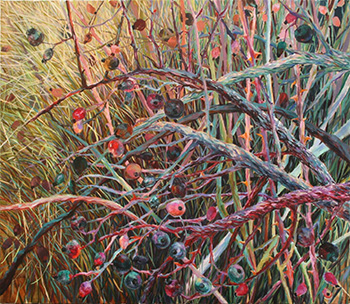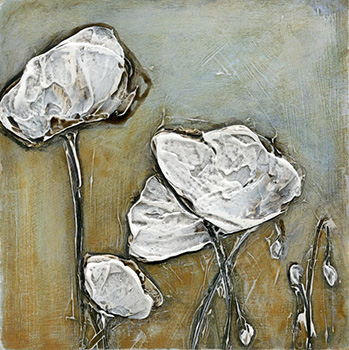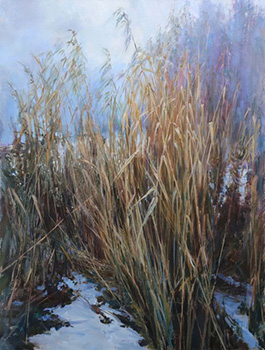From Our Archives
For earlier essays on this week's RCL texts, see Amy Frykholm, Our Hidden Future (2022); Debie Thomas, Like a Thief (2019); Melissa Early, Wake Up! (2016); Dan Clendenin, Before and After (2010); and Joan Roughgarden, Bringing Heaven to Earth Here and Now (2007).
This Week's Essay
By Amy Frykholm, who writes the lectionary essay every week for JWJ.
Romans 13:11: “You know what time it is; it is already the moment for you to wake from sleep.”
For Sunday November 30, 2025
First Sunday in Advent
Lectionary Readings (Revised Common Lectionary, Year A)
Psalm 122
Romans 13:11–14
Matthew 24:36–44
This year the first real snow announced itself with a long rumble of thunder. I was sitting on the couch when I heard it, and then looked out the window to see snowflakes, at last, fluttering down. We’d been waiting, so maybe that’s why the clouds felt like a declaration was necessary: look up!
The next day I went for a walk in the newly snow-covered woods, and I thought about my Advent wreath. For more than 20 years I have been making the same Advent wreath, although it is never an exact replica of the previous year’s attempt. It starts with a dish that can fit four candles around. Then I fill the dish with birdseed.
The next part is the most essential. I go out into the woods or the cemetery or the alleys, and I look for natural shapes and colors that are of the moment. The dried poppy heads are probably my favorite, because after the poppy has bloomed and the petals have fallen off, the remainder looks like a star, with a dark heart like a black hole.
But I also love how different each head of grass is. There is a stunning variety. For color I look for kinnikinnick berries and rose hips. I look for spruce branches and pine cones. The key to this searching is that whatever I find, it speaks to the now and the here. The reason I’ve kept this practice up is because in the deadness of early winter, I find beauty that never fails to surprise me.
I lay this bounty on the birdseed in whatever way inspires me. When Advent is over, I toss the whole thing near the bird feeder for what poet Ada Limón calls the “after party.”
 |
|
Rima Azatyan, Rose Hip (Winter) (2019).
|
We are entering the season of Advent, and the Gospel for this first week is layered with and haunted by so many kinds of time that it is hard to get them straight.
The first kind of time that we encounter in Matthew we might call apocalyptic time. In Jewish faith and in the emerging Christian tradition, people had the idea that a significant event of some kind was coming — a great unveiling of God’s ultimate purpose. They were on the watch for it, trying to read the stars and the earth and the politics of the day for evidence of this great moment to which they gave names like Judgment Day and, in this passage, mysteriously, “the coming of the Son of Man” (Matthew 24:39). Presumably this would be a time to end all time. This kind of belief is what has made Christianity a teleological religion, rather than a cyclical one. Even in the seasonal aspects of our faith, we’ve carried forward the idea that time is becoming something, moving toward an end.
Layered into this belief about time is a story about the past. This is the second kind of time, signaled by the words “as the days of Noah” (Matthew 24:37). Jesus’ culture had held on to a story about a time in the past that was so cataclysmic that it changed everything. They told this story again and again. The first people who experienced that cataclysm and en-storied it transmitted it thousands of years forward. Amazingly, we still have this story today. Perhaps we can call this kind of time chronological time because it involves transmission through generations — one passed to the next to the next. What we learn from the past is somehow implicated in what we can anticipate for the future (Matthew 24:39).
 |
|
Denise Souza, Winter Poppies III.
|
But Jesus also points to another kind of time: time that is hidden in God’s knowing, not even in Jesus’ knowing (Matthew 24:36). This is a kind of time outside of time. There is so little that we can say about it, maybe it isn’t even time at all. The word fails, the logic of time fails, and the word “Father” (the only word for God in this passage) feels like a substitute for a word we don’t have and will never have.
The lack of the word, however, doesn’t change the urgency that exists in this passage. Unknowing doesn’t suggest no action. The urgency of time that is expressed here we might call kairos — as Paul does in Romans 13:11 — as opposed to chronos. This is the time of the moment, the ripened time. Here kairos is expressed in a string of metaphors: two in the field, two grinding grain, a thief in the night. And it is the only kind of time that requires our action: stay awake, be ready, pay attention (Matthew 24:40–44).
Kairos time introduces us to our wild and unpredictable God. This is not the God of The Bible Code, where everything can be deciphered if we just apply the right numerological formulas. This also isn’t the sentimental God of commercial Advent, where we go through the cycles of Christmas preparation. This is a God that the poet W.S. Merwin calls “Nameless One, Invisible, Untouchable Free.” This is the God of the owl in a Mary Oliver poem, “Coming down out of the freezing sky/with its depths of light.” The God of kairos time is terrifying. If we’re afraid, it’s because God exceeds our understanding and often does not seem to have our best interests at heart. Like the people of Noah’s time, we might like to avoid the presence of this God. But this God is the God of now. The God of here. The God coming to be in our midst.
 |
|
Igor Viksh, Dry Grass.
|
We might think that this passage is intended to cultivate our fear. It serves as a threat. Judgment Day is right around the corner. The future is terrifying, and you are right in the line of fire for an angry God. This passage has inspired a million sandwich board signs, “The end is near.” We might think it is urging us to lock up our houses and install doorbell cameras, fear our neighbors, hole up and stop sleeping at night like doomsday preppers. The passage certainly invites this as a possible reading.
But if the passage is about spiritual awakening, then the actual request is the opposite of self-protection. It’s instead asking for an intense vulnerability that can feel equally scary, perhaps even scarier. It’s asking for a willingness of the soul to be present with God, and admitting that the soul might prefer to lock up the house. The only way I actually know to have this awakening is like that roll of thunder announcing the first snow. Attend to the now. If the Gospel is a message of love and not a message of fear, as our best sages have urged us to understand, then love is always, already, the moment of now.
Weekly Prayer
Jan Richardson
Who wait
for the night
to endbless them.
Who wait
for the night
to beginbless them.
Who wait
in the hospital room
who wait
in the cell
who wait
in prayerbless them.
Who wait
for news
who wait
for the phone call
who wait
for a word
who wait
for a job
a house
a childbless them.
Who wait
for one who
will come homewho wait
for one who
will not come homebless them.
Who wait with fear
who wait with joy
who wait with peace
who wait with ragewho wait for the end
who wait for the
beginning
who wait alone
who wait togetherbless them.
Who wait
without knowing
what they wait for
or whybless them.
Who wait
when they
should not wait
who wait
when they should be
in motion
who wait
when they need
to rise
who wait
when they need
to set outbless them.
Who wait
for the end
of waiting
who wait
for the fullness
of time
who wait
emptied and
open and
readywho wait
for you,o bless.
Jan Richardson, Circle of Grace: A Book of Blessings for the Seasons (Wanton Gospeller Press, 2015). See janrichardson.com.
Amy Frykholm: amy@journeywithjesus.net
Image credits: (1) Art Majeur; (2) DSF Paintings; and (3) ArtPal.com.





